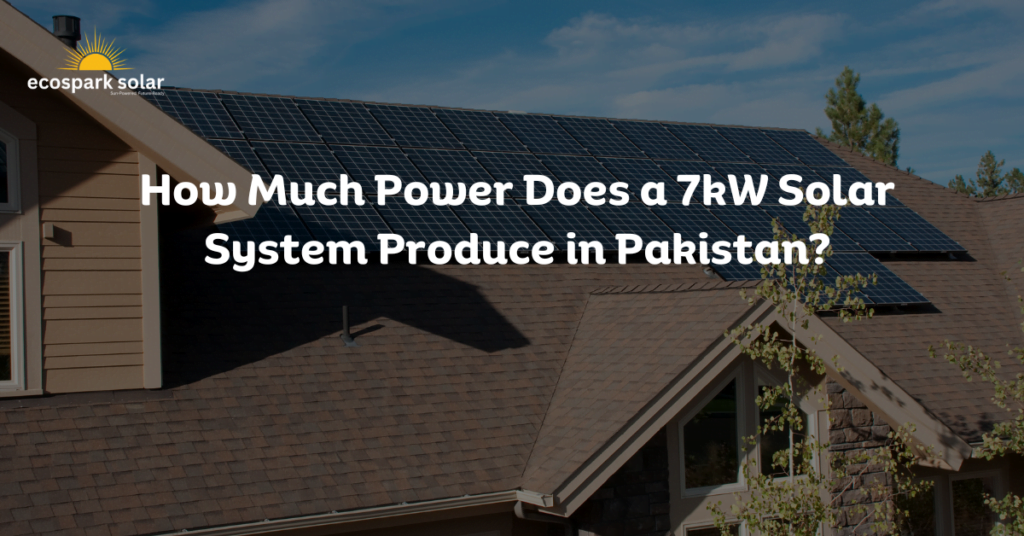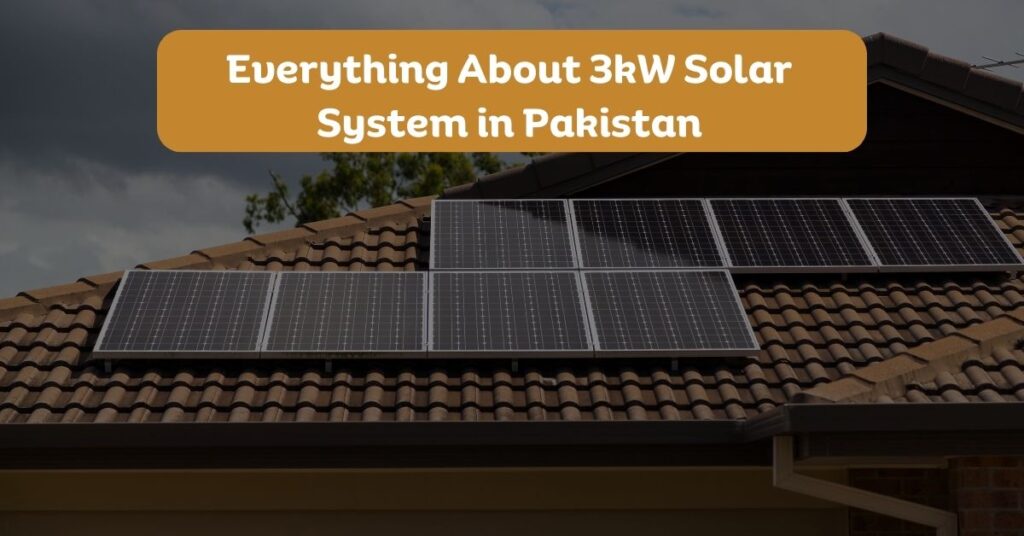7kW solar systems have emerged as a popular choice for mid-sized homes and businesses. They are enough for most homes, as you can run all essential appliances with this, including a couple of air conditioners.
If this system has caught your attention, it is natural to ask: how much power does a 7kW solar system produce in Pakistan? Once you know this, the journey becomes easier. And that’s what we will be discussing in our today’s entry.
To be specific, we will explore the following aspects of a 7kW solar system:
- How to determine the energy output of a 7kW solar system?
- How much power does a 7kW solar system produce in Pakistan?
- Factors that influence the production capacity of a 7kW solar system.
- The electricity production of a 7kW solar system in various cities of Pakistan, such as Islamabad, Karachi, Peshawar, Quetta, Lahore, and more.
- Tips to optimize the energy generation of a 7kW solar system.
First of all, let’s discuss a what dictate the energy production of solar panels. That would help you understand the next sections.
Factors Influencing Solar Power Production of 7kW Solar Systems
The power output of a 7kW solar system can be influenced by quite a few factors. Even systems with similar specifications and features may generate varying amounts of power based on their location and components from different brands.
Sunlight in Your Area
Sunlight exposure is the single most critical element in solar system energy production. Different regions experience different levels of solar irradiation. For instance, in Pakistan, the average solar irradiation ranges from 4 to 7kWh/m2/day. In simple words, Pakistan experiences around 4 to 7 peak sun hours per day.
These figures may fluctuate depending on season or location—in Islamabad, the number of peak sun hours stands at 5.5. Note that peak sun hours do not mean for how long the sun is out; it means the kind of sunlight that could be converted into energy. If you want to know more, our comprehensive guide contains further details of peak sun hours in Pakistan, including the relevant maps.
Solar Panel and Inverter Efficiency
Next, is the efficiency of solar panels and inverters. The average efficiency of solar panels available in Pakistan is about 18%, with more recent models offering upwards of 20% efficiency. To optimize system performance, we suggest selecting Tier-1 solar panels, which offer higher efficiencies.
Similarly, the efficiency of inverters is also important—if your inverter cannot convert all the incoming DC electricity into AC, the system’s power output will be compromised.
Elevation Angle and Orientation of Solar Panels
The orientation and tilt (elevation) angle of solar panels are two other important considerations. Orientation refers to how solar panels are placed against the sun, while the tilt angle refers to the vertical angle on which panels are lifted from the roof surface.
In Pakistan, the ideal orientation of solar panels is south-facing at 180 degrees. As far as the elevation angle is concerned, it should match the latitude of the installation location. It could typically anything between 23 to 37 degrees. In Islamabad, the recommended tilt angle would be 28 to 35, depending upon the season you want your system to optimize for.
If you want more, we have a resource that offers more comprehensive advice on calculating solar panel directions and angles in Pakistan.
Dust and Debris on Your Panels
Accumulation of dust, debris, or bird droppings on solar panels can lower their ability to absorb sunlight, ultimately impacting the power they can generate. Regularly cleaning solar panels is necessary in order for panels to work at their best.

Now that we are done with the factors, let’s discuss what you are here for. That is, how much power do 7kW solar panels produce?
A solar system for everyone.
We’re customer-centric; we will find you a solution within your budget. Whatever your project size, you can always save with Ecospark Solar.
How Much Power Does a 7kW Solar System Produce in Pakistan?
A 7kW solar system in Pakistan can generate between 25 and 33 kWh of electricity per day, or 750 to 990 units per month. Such a system is well-suited for powering large homes or businesses that consume around 600 to 700 kWh of electricity monthly, providing ample energy to run appliances like refrigerators and a couple of small air conditioners.
How did we calculate this?
To calculate the electricity generated by one solar panel per day, we use the following formula:
| Daily production of a solar panel = Solar panel capacity x Peak sun hours x Efficiency factor |
For a 7kW solar system, assuming 5 peak sun hours and an efficiency factor of 0.8, the daily production would be:
| Daily Production of 7kW System = 7,000 watts x 5 x 0.8 = 28 kWh (units) |
Actual power generated by your 7kW solar system may vary depending on factors such as your location, weather conditions, and system efficiency. For instance, in areas that receive 6 sun hours, the power produced per day would be 33.6 kWh (units).
To determine the monthly production, simply multiply the daily generation capacity by 30.
| Monthly Production of 7kW System = Daily Production x 30 = 28 x 30 = 840 kWh (units) |
Also, note that substandard solar panels or inverters would not give you the power we estimated in the formula above. This is only for tier-1 solar panels and inverters with an efficiency above 95%.
Wonder how much such a system may cost? Read our article on the price of different types of 7kW solar systems.
Power Generation of a 7kW System in Different Pakistani Cities
The power generation potential of a 7kW solar system may vary slightly across different cities in Pakistan due to variations in solar irradiance levels and weather conditions.
Let’s take a look at power production estimates in some major cities:
How much power does a 7kW system produce in Islamabad?
Islamabad/Rawalpindi receives an average of 5.5 peak sun hours per day. Thus, a 7kW solar system in Islamabad/Rawalpindi can generate an average of 28 kWh of electricity per day or approximately 840 units per month. With its favorable solar conditions, Islamabad is an excellent location for solar energy adoption, especially with the availability of net metering.
How much power does a 7kW system produce in Karachi?
In Karachi, a 7kW solar system can generate an average of 25-29 kWh of electricity per day, or 750 to 870 monthly units. Karachi receives an average of 5.2 kWh/m2/day of solar irradiation, comparable to the national average of Pakistan. Given the potential of solar power and the Karachi Electric rates and load shedding schedule, it is no wonder why Karachi is rapidly adopting solar energy.
How much power does a 7kW system produce in Lahore?
7kW solar systems in Lahore can produce an average of 28 kWh of electricity per day, similar to the power production potential in Islamabad. Just so you know, Lahore receives an average solar irradiation of 5.4 kWh/m2/day.
How much power does a 7kW system produce in Peshawar?
A 7kW solar system in Peshawar would generate an average of 26-28 kWh of electricity per day. Peshawar receives an average solar irradiation of 5.3 kWh/m2/day, which is considered more than ideal for installing a solar system.
How much power does a 7kW system produce in Quetta?
In Quetta, a 7kW solar system can produce an average of 24-30 kWh of electricity per day. Quetta receives an average solar irradiation of 5.1 kWh/m2/day. During summer, this figure could even surpass the power generation potential of Islamabad.
Please note that these figures serve as estimates, and actual power generation may vary based on specific factors and seasonal variations in sunlight availability.
Also, a piece of advice: if your area receives frequent load shedding, we recommend installing a hybrid system, as it works when there is no electricity. But if the load shedding is minimal, go for an on-grid solar system—they are low-cost, with a better payback period. And if you want complete independence, an off-grid system is what you should choose.
| You May Like to Read: Comparing Solar Installation Types: On-Grid vs. Off-Grid vs. Hybrid Solar |
What Can You Run With a 7kW Solar System?
A 7kW solar system can power a wide range of appliances. For example, it can support up to 10 fans, numerous lights, 2 1-ton air conditioners, a microwave, an iron, a refrigerator, LED TVs, a washing machine, 2 PCs, and more. If you have additional appliances, such as an extra air conditioner, a 7kW solar system can still cater to these needs. However, it’s essential to ensure that the overall load doesn’t become the instantaneous power generation capacity of the system.
The capacity to run these appliances depends on the solar panel’s efficiency, sunlight availability in the area, and the usage patterns of the appliances.
How to Maximize the Power Output of Your 7kW Solar System?
To optimize the power output of your 7kW solar system, consider implementing the following measures:
- Select high-quality solar panels with higher efficiency ratings. Also, make sure that the inverters are of the highest quality—these days, there are too many inverters. Stick to those which can offer around 97-98% efficiency.
- Ensure proper panel orientation and tilt angle, which can be effectively handled by professional installers.
- Regularly clean and maintain the panels to remove dust or debris. You can do that yourself—or ask professionals to do that for you.
- Monitor system performance to identify any issues or inefficiencies, contacting your solar installer promptly if any problems arise.
- Choose an appropriate installation location to minimize shading.
Wrapping Up
A 7kW solar system can generate between 25 to 33 units per day, corresponding to 750 to 990 units of electricity per month in Pakistan. Thanks to its short payback period, these systems offer a practical and cost-effective solution for medium-sized homes and businesses. Just make sure that the system is installed properly and all things that optimize the production are kept in mind.



